
R Dean Davenport
ATTORNEY AT LAW
Donate via GiveSendGo.com
R. DEAN DAVENPORT ATTORNEY AT LAW
2150 S. Central Expy, Suite 200
McKinney, TX 75070-4070

Deciding to start the estate planning process is an essential step in ensuring your loved ones are cared for once you are gone. An estate plan allows you to decide how your assets are divided following your death. It also makes things easier for your beneficiaries to know how you want your estate handled. However, as you start working on your estate plan, choose the right estate planning methods. Many people believe all they need to do to create their estate plan is draft a will. This may not be the case.
Wills are a simple and inexpensive way to distribute your assets and possessions following your death. Indeed, they are a key component of any estate plan. However, a will by itself can't do everything. There are some types of property that can't be transferred in a will. This means that creating a will may not be sufficient depending on what you are trying to accomplish. Here is a look at answers to frequently asked questions we receive about what a will can and cannot do.
Is There Any Property You Can't Transfer in a Will?
When creating an estate plan, remain aware of what kinds of property can and cannot be transferred through a will. For instance, you cannot gift property that is owned in joint tenancy with someone else. Indeed, this type of property automatically transfers to the surviving owner upon your death. You also cannot gift property for which you've already named a beneficiary. For example, a life insurance policy, a pension plan, or a 401 (k). Similarly, any payable-on-death bank accounts for which you've named a beneficiary cannot be transferred using a will. Your estate planning attorney helps you determine what property your will can and cannot include.
What if I Want to Leave Money to My Pet?

Many people consider their pets close as family. Thus, they want to do everything in their power to make sure that their furry friend is cared for once they are gone. However, pets cannot own property, so they cannot inherit money directly from you in a will. If you are concerned about who will care for your pet once you are gone, leave your pet to someone you trust. Then, you can leave that person with some money to help them out with care-related expenses.
Depending on the state you live in, you may also have the option to set up a trust for pet care. You can enable the person you name as trustee of the pet trust to use these funds to care for your pet during their lifetime.
Can I Leave Funeral Instructions in My Will?
While it is possible to include funeral instructions in your will, the problem with doing so is that wills often aren't read, or even found, until days or weeks after a person's death. This often makes funeral directions left in a will of little use to your loved ones. If you have specific wishes for how you want your body and memorial service handled following your death, you are better off creating a separate document spelling out your wishes and telling your executor where they can find it once you are gone. Better yet, ensure your wishes are followed by working with a funeral home.
How Do I Put Conditions on a Gift?
It is not uncommon for people to want to make gifts to beneficiaries contingent on certain conditions. For example, requiring a loved one to go to rehab or finish college before they can benefit from the estate. However, conditions like these are often difficult to enforce using a will, as assets are distributed soon after your death. If you want to make gifts in your estate plan that are contingent on pre-determined conditions, it is usually easiest to do so using a trust. This way, it will be up to your trustee to decide if and when funds should be released. This would allow you to leave gifts to loved ones with specific conditions attached. For example, giving your grandchildren a sum of money once they graduate college.
Can a Will be Used to Make Arrangements for a Beneficiary With Special Needs?
If you have a loved one with special needs who you want to ensure is provided for once you are gone, you will need to consider setting up a trust for this purpose. The fact is that a living will isn't going to allow you to make the proper arrangements for your loved one. However, a special needs trust that's tailored to the needs of the beneficiary will ensure your loved one is taken care of. Creating a special needs trust will also allow you to set aside money that can be used for the care of your loved one without jeopardizing any government benefits they may have. It is important that you work with an experienced estate planning attorney to ensure that the trust you create takes proper care of your loved ones.
Use a Probate Lawyer or an Estate Planning Attorney to Execute Your Will
While a living will is an essential component of any estate plan, there are limitations to what it can do. This is why it is essential that you work with an experienced estate planning attorney. They help you determine what you need to include in your estate plan in order to meet your goals.
Feel free to contact us to learn more about the estate planning process.
For more information please request a copy of our Legal Services Schedule (PDF format).
![]()

When they are estate planning, people often spend the most time determining what will happen to their most valuable assets. However, it is equally important to consider what will happen to small personal property. While it may not have much market value, this includes items of sentimental value. For instance, this might include jewelry, dresses, or family artwork.
Even items that are seemingly insignificant to you could mean something to your loved ones. Thus, it could cause fighting within your family once you are gone. This makes it important that you think about what will happen to your personal belongings when you are gone. This could help avoid confusion, hurt feelings, and fighting once you are gone.
To help ensure that there is as little conflict as possible following your death, consider bequeathing family heirlooms and sentimental assets to your loved one in your will or trust. Keep reading for answers to frequently asked questions about leaving items of sentimental value in an estate plan.
Should I Discuss Items of Sentimental Value With My Family?
One of the reasons people like to bequeath heirlooms and items of sentimental value in their estate plan is to avoid potential fighting amongst family members once they are gone. However, hurt feelings and confusion could still arise if relatives feel scorned by the decisions you made. You may then find it helpful to discuss what items you plan on making specific arrangements for with your family. Then, ask if anyone has particular items they are attached to. This could help you understand which family members value which items.
While conversations surrounding a death can be awkward, this gives you a chance to discuss who inherits which family heirlooms now so that there is no confusion later on. Even if certain items are wanted by multiple people, you have a chance to explain your decisions now. This can potentially prevent conflict after your death.
Are There Benefits to Bequeathing Assets While I'm Still Alive?
Of course, if you are concerned that certain items could cause disputes amongst your relatives once you are gone, you may find it beneficial to start handing them out as gifts while you are still alive. In doing so, you can ensure that your belongings go to the relatives that you intended.
Gifting your belongings to your loved ones during your lifetime also has the added benefit of allowing you to see their reaction to receiving items of sentimental value. You will even get to see them enjoy your gift.
Gifting family heirlooms can also help facilitate fun conversations about your family history and the origin of certain items. Passing on family history is important in order to ensure those stories are not lost. Additionally, discussing family heirlooms now can help your loved ones become knowledgeable before it is too late.
How Can I Distribute Assets in My Estate Plan?
Even if you talk to your relatives about which family heirlooms they'd like to inherit, you may still choose to wait and arrange to have these assets distributed to them upon your death. If this is the case, you can use a will or living trust to make specific bequests of property. The person who is in charge of handling your estate after your death (your executor you name in your will, or your successor trustee if you create a living trust) will then be in charge of getting your personal property to the people that you named to inherit them.
Of course, you do not need to make specific arrangements for every item you own. Concentrate on personal property that has the greatest sentimental value to your loved ones. You may then choose to simply guide your beneficiaries to divide your remaining belongings equally.
What Is a Property Memorandum?

Detailing every item you want to bequeath to your loved ones in your will is tedious. Instead, many states allow you to make a separate list of items that outlines who you want to inherit each item called a "property memorandum" or a "memorandum of tangible property items".
The advantage of including this document in your will is that it can be easily updated or changed without having to go through complex amendments to your will or trust. If you get rid of an item, acquire something new, or change your mind about who you want an item to go to, simply make a new list.
This document is legally binding, but it can only include tangible items. You cannot list money or other intangible property in a property memorandum.
What Is a Letter of Instruction?
If your state's law does not allow you to create a property memorandum but you don't want to list specific items in your will or trust, you may want to write an informal letter of instruction.
While this document is not legally binding, it is likely to be taken seriously by your family. It can also influence how your assets are distributed. Additionally, should certain items cause dispute amongst your relatives, your letters of instruction can have an impact on any decisions made by the court.
You can make your letter of instruction as detailed as you wish. Further, you can even include an explanation for any decisions that may surprise your loved ones.
Leave Your Items of Sentimental Value to Family Members
Contact us for assistance if you are looking to leave items of sentimental value in your will or trust. We can help you determine the best course of action to take given the needs of you and your family.
For more information please request a copy of our Legal Services Schedule (PDF format).
![]()

When it comes time to start the estate planning process, you will likely find yourself with a lot of questions and concerns about what steps you should take next. This is understandable, as creating an estate plan is a complex process, and with several estate planning options available to you, it can be hard to know which option is right for you and your family. One of the most common questions people have when they start their estate planning journey is whether they really need to create a living trust. Unfortunately, there is no definitive answer to this question.
While a living trust provides many benefits and is a popular estate planning option, the fact is that not everyone needs a living trust. Depending on the complexity of your estate, you may find that creating a will sufficiently meets your estate planning needs. Yet, how will you know if this is the right path for you? To help you decide what to include in your estate plan, here is a look at answers to the most frequently asked questions we receive about how to tell if you really need a living trust when estate planning.
Can a Will Avoid Probate?
One of the most common reasons people choose a living trust over a will is that doing so can help much of their estate to avoid the probate process. Probate is the legal process that most estates much pass through after an individual dies that helps inventory and distribute their assets amongst their beneficiaries and heirs. While a will can help guide a probate judge as to how you want your assets divided, it will not keep your estate out of probate. Many people try to take steps to ensure that the majority of their assets are able to be transferred to their inheritors outside of probate, as probate is a time-consuming and expensive process.
However, if your estate is relatively simple, you may be able to keep the bulk of your assets out of probate without a living trust by making gifts before your death, adding a pay-on-death designation to bank accounts, and by naming a beneficiary on your life insurance and retirement accounts. Thusly, while a living trust provides broad estate planning options that can help most of your assets avoid probate, those with less complicated estates may be able to keep their assets out of probate using other means if they don't want to establish a living trust.
Are There Drawbacks to a Living Trust?
You may find yourself wondering why anyone would choose to rely solely on a will if a living trust could help your loved ones avoid the stress and expense of probate after your death. While living trusts can be useful for many people, they do have downsides. For instance, compared to creating a will, living trusts are much more difficult to establish. Living trusts also require ongoing maintenance, and they can be expensive to draft. For those with simple estates involving assets that can transfer outside of probate, a living will present a much simpler, cost-effective estate planning option that allows them to ensure they have a say in how their estate is handled once they are gone without having to go through the complicated process of establishing a trust.
Is a Living Trust Really Necessary?
This may lead you to wonder how you will know if a living trust is right for you, or if you can get by with just a will. Considering the following factors can help you to decide whether or not a living trust is really necessary given where you are at in life.
How Old Are You?
The first thing that you should consider when trying to decide if you really need a living trust is your age. The fact is that someone with modest estates who is in good health and is under the age of 50 likely doesn't really need to worry about probate costs. The fact is that someone in their 40s is relatively young, which could mean spending decades managing and updating a living trust that does nothing for you during your lifetime. While it is a good idea to consider estate planning at any age, most adults under the age of 50 would be fine simply creating a will that would help transfer their property in the unlikely scenario that they die without warning. You could then choose to establish a living trust down the road if necessary.
How Large Is Your Estate?

Of course, another big factor to consider when deciding whether or not you should create a living trust is how wealthy you are. While wealth should not be the sole deciding factor when choosing between a will and a living trust, the fact is that the wealthier you are, the more your inheritors stand to gain by avoiding the probate process. Thusly, a young individual with a complex estate and a large portfolio of assets and investments may decide that they need a living trust in order to protect their loved ones.
You may also be better off with a living trust if you own a small business that you don't want to be tied up in probate proceedings after your death. However, a young individual with modest assets, many of which could be transferred outside of probate, may decide that a living will meet their needs for the time being.
Consider Consulting an Estate Planning Attorney
When starting the estate planning process, it can be difficult to know whether a will or a trust is the right option for you. This is why it is critical that you consult an experienced estate planning attorney to help you get started, as they will be able to guide you through your options and help you make an informed decision based on your unique circumstances. Feel free to contact us to learn more about how you will know if you can get by with a living will when estate planning.
For more information please request a copy of our Legal Services Schedule (PDF format).
![]()

For married couples looking to protect the assets they have built together, estate planning is a must. However, if you live with a life partner you are not married to, or you are in a domestic partnership/civil union, it is equally important to create an estate plan. The fact is that marriage rates have fallen in recent years, and the number of U.S. adults in cohabiting relationships has climbed to over 18 million, up 29% since 2007. Yet, while unmarried cohabitation is growing in popularity, this can present numerous legal problems. Indeed, unmarried couples won't be able to make end-of-life decisions, or inherit from, each other. Estate planning for unmarried couples is then critical in order to ensure that you and your partner's rights are protected should the unexpected occur.
If you currently live in unmarried cohabitation with your partner and are considering how this will affect your estate planning needs, here is a look at answers to the most frequently asked questions we receive about estate planning for unmarried couples.
What Happens if Unmarried Couples Don't Have an Estate Plan?
You may find yourself wondering why exactly it is so important that unmarried couples ensure they have an estate plan. At its essence, estate planning serves two functions: to determine who can make decisions for you if you become incapacitated and to determine who gets your assets when you die. Of course, there are laws in place to protect spouses who did not make an estate plan. If one spouse becomes incapacitated, the other will be able to make healthcare decisions for them. Additionally, if one spouse dies, the property will be distributed to the surviving spouse and children. However, there are no laws in place to protect unmarried partners.
Should one partner die, the surviving partner will not benefit from their estate no matter how significant the relationship was. The deceased's assets will go to their surviving relatives, even if that's not how the deceased would have intended it. This makes it critical that unmarried couples create an estate plan that protects each other and ensures their wishes are followed once they are gone.
What About Assets We Own Together?
Unmarried couples who have been together for a significant amount of time may have acquired assets together such as a house and cars. What happens to these assets when one partner dies? In order to ensure that property passes to an unmarried partner, it is essential that you make sure that the property is owned jointly with right of survivorship. This way, when one partner dies, the surviving partner automatically owns 100% of the property. To do this, you will need to put both of your names on the asset's title documents such as a car's title or the deed to your house. Not only will this ensure that the surviving partner doesn't get left out in the cold, but this is also a good way to help portions of the estate avoid probate.
What Should Unmarried Spouses Include in an Estate Plan?
While every couple, married or not, should create an estate plan to ensure their wishes are followed once they are gone, estate planning is particularly important for unmarried couples in order to ensure you or your partner are protected should one of you die or become incapacitated. Yet, you may find yourself wondering what you should include in your estate plan in order to ensure your wishes are followed. When creating an estate plan, unmarried couples should consider including:
Wills and Trusts
One of the most important things you can do to protect your partner if you are unmarried is to create a will and/or trust, as this allows you to leave your property, assets, and belongings to the recipients you choose (including your partner). If you do not have an estate plan in place when you die, your property will be divided in accordance with your state's intestacy laws, and your assets will likely go to your children, parents, or siblings. Creating a trust/will then avoids this problem as you can specify who benefits from your estate.
You can even name your partner as the trustee of the trust, or executor of your will, as this will give them the ability to manage your estate in the event of your death. Creating a will and/or trust is the best way to ensure that an unmarried partner has the right to inherit your estate following your death.
Beneficiary Designations
Another way to protect your partner if you are unmarried is to ensure that they are designed as the beneficiary on all of your important financial accounts. Review the beneficiary designations on bank accounts, retirement funds, and life insurance policies to make sure that your partner is the beneficiary. While they will not have access to these accounts during your lifetime, they will inherit these assets seamlessly upon your death regardless of your marital status. Doing this is easy and does not cost anything, and you can alter your beneficiary designation down the road should you change your mind.
Health Care Proxy and Durable Power of Attorney

It is also essential that you include a health care proxy and a durable power of attorney in your estate plan in order to ensure your partner's rights are protected should you become incapacitated. Should you fall seriously ill or are incapacitated in any way and cannot make medical or financial decisions for yourself, the power to make these decisions will go to your closest relatives (either your parents or siblings). Not only will your partner not have any say in how your affairs are handled, but your relatives could even freeze them out and not include them in the decision-making process at all. In fact, unmarried individuals can even be barred from visiting their partner in the hospital without the proper legal documentation in place.
A durable power of attorney and health care directive will then ensure that your partner will be allowed to visit you, take care of your finances, and make end-of-life healthcare decisions for you, should you fall ill.
Learn More About Estate Planning for Unmarried Couples
With unmarried cohabitation on the rise, it is important that unmarried couples are aware of the steps they need to take to ensure their rights are protected should their partner die or become incapacitated. Feel free to contact us to learn more about the steps that you should take when estate planning to ensure that you and your partner are protected should one of you fall ill or die.
For more information please request a copy of our Legal Services Schedule (PDF format).
![]()
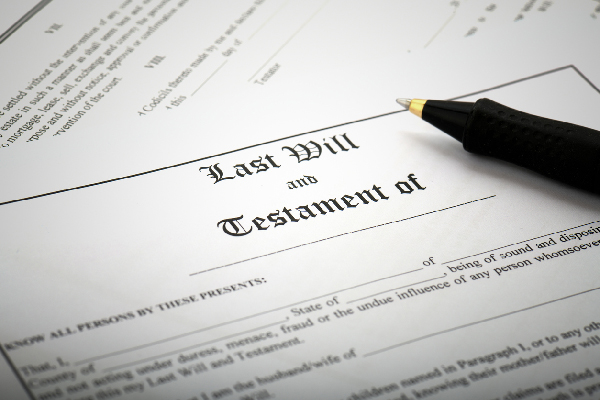
Additional FAQs About Wills - Your Guide to Estate Planning
By creating an estate plan, you can help to ensure that your wishes are followed regarding the distribution of your assets once you are gone. However, people just starting the process of creating an estate plan may experience confusion with the process. There are many misconceptions about how wills and other estate planning documents work.
We have previously looked at what a last will and testament is. However, you are not alone if you still have questions about how this document works and how you will know if you should include a will in your estate plan. Need help to better understand your estate planning options? Read on for a look at additional frequently asked questions we receive about wills.
Do You Need a Minimum Amount of Assets to Create a Will?
One of the biggest misconceptions about wills, and about estate planning in general, is that creating one isn't necessary if you aren't rich. You might think that you need a minimum amount of assets in order to create a will.
However, this is as far from the truth as possible. The fact is that anyone over the age of 18 can create a will regardless of the worth of their estate. No estate is too small for estate planning. An estate plan can make things easier for your loved ones following your death no matter how many assets you have.
In fact, a will is often the preferred estate planning method for people with small, uncomplicated estates who don't own property. This is because wills are simpler to set up and alter than a trust. In these cases, a will provides a simple and affordable way to ensure that your family follows your wishes once you are gone.
What is the Difference Between a Last Will and Testament and a Living Will?
Oftentimes when discussing estate planning, people will use the terms "will" and "living will" interchangeably; however, these are actually two separate and distinct documents that are both essential components of a comprehensive estate plan.
A last will and testament, often simply referred to as a will, provides directions on how you want your estate divided upon your death. Meanwhile, a living will is a legal document that provides directions on how you want decisions to be made regarding your health while you are still alive. Should you become incapacitated and medical decisions need to be made on your behalf, a living will can provide your family and medical professionals with instructions on how you want to be cared for.
For instance, people will often use a living will to designate whether or not they want to be resuscitated or put on life support should they fall critically ill. Some states also call a living will an Advanced Health Care Directive.

Can Someone Challenge My Will After My Death?
Incorporating a will into your estate plan can be a great way to provide your family with guidance on how you want your assets handled following your death. As long as the will is valid, most families and probate courts will respect the wishes of the testator (the person who created the will) as outlined in the will. However, wills are not foolproof, and they can be challenged by disgruntled relatives under certain circumstances.
In rare cases, a relative of a deceased individual may try to contest a will in court. This is due to the fact that they feel cheated out of a portion of the testator's estate that they feel entitled to. Fortunately, challenging a will is not a simple matter. An individual must prove that the will was either forged, created under coercion, or that the testator was not of sound mind when the will was created. This is why it is critical that you are careful when drafting your will to help prevent legal challenges. Working with an experienced estate planning attorney can help ensure that your will holds up against potential challenges in court.
Can a Will Help My Estate Avoid Probate?
Another common misconception about wills is that they will help an estate to avoid probate court. In reality, a last will and testament provides guidance on how to divide your estate. However, your estate must still pass through probate court so that a judge can validate your will and oversee the dispersal of your assets.
Unfortunately, this often comes as a surprise to families who believed that they would be able to avoid the hassle and expense of probate court if their loved one had a will. Ultimately, a desire to avoid probate is often the deciding factor that leads people to choose a trust instead of a will when creating their estate plan. You can transfer assets transferred to a trust to beneficiaries without the need for probate court. This allows for a simpler, faster, and more private dispersal of assets following a loved one's death. If helping your family avoid probate is your primary concern when creating an estate plan, consider working with an estate planning attorney to learn about which options may work best for you.
Do I Need to Have a Lawyer to Create a Will?
One of the most common questions people ask about wills is whether it is required that they work with a lawyer when drafting their will. The answer to this question is no; no state law requires you to get the assistance of a lawyer when creating a will. However, if you plan on creating your own will, it is imperative that you spend some time researching estate planning laws in your state in order to ensure that you fill everything out properly and have the required witnesses and signatures.
You may not need to work with an attorney when estate planning. However, we highly recommended that you do so. Even something as seemingly simple as creating a will can prove to be a complicated process. Working with an experienced estate planning attorney will ensure everything is done correctly. The last thing you want to happen is to spend time creating a will only for your family to discover after your death that it is invalid.
Work with an Expert to Help You with Estate Planning
Estate planning can often feel like an overwhelming and confusing process. This is why it is a good idea to consider working with an attorney as you create your estate plan. Feel free to contact us to learn more about wills, trusts, and the steps you should take when estate planning.
For more information please request a copy of our Legal Services Schedule (PDF format).
![]()
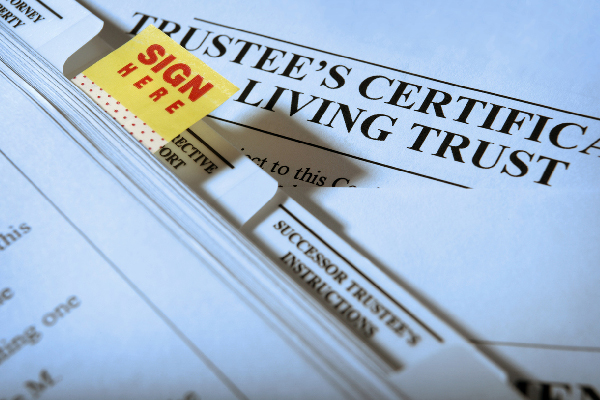
During the estate planning process, you will have to make personal decisions about who will inherit your property. Also, consider how you want to divide your assets amongst your various beneficiaries. However, what happens if you and your spouse are estranged? With the complexity of modern relationships, people limit their spouse's inheritance in their will. This is particularly true if they have children from a previous relationship that they want to be their primary beneficiaries. Yet, this raises the question of whether or not you can completely disinherit a spouse. To help you better understand your options if you wish to limit the extent to which your spouse benefits from your estate, keep reading for a look at answers to the most frequently asked questions we receive about disinheriting spouses.
Can I Disinherit My Spouse?
While many people believe disinheriting a spouse is as simple as leaving them out of their will/trust and other estate planning documents, this is not the case. In fact, in most states, you can not completely disinherit a spouse unless they agree in writing to be disinherited. Even if you decide not to include them in your will or trust, your spouse may still be legally entitled to a portion of your assets. Laws on what a spouse is legally entitled to upon your death vary greatly from one state to the next; however, if you live in a community property state like Texas, even a "disinherited" spouse will receive a significant portion of your assets.
How Does Spousal Inheritance Work in the Community Property States?
As you may already be aware, Texas is what is considered a community property state. If you live in a community property state (at this time there are nine community property states: Arizona, California, Idaho, Louisiana, Nevada, New Mexico, Texas, Washington, and Wisconsin), property acquired during your marriage belongs to both you and your spouse equally regardless of who earned the income or whose name is on the deed/title. For instance, if you purchased a car during your marriage using your money and the title is only in your name, this would still be considered community property.
Thusly, if you live in a community property state and try to disinherit your spouse by leaving them out of your will, they will still be entitled to half of all property and assets acquired during your marriage. However, you are free to distribute your half of community property as you see fit in your will/trust, and your spouse is not entitled to any separate assets that you acquired before your marriage. In fact, your spouse does not have any claim to assets deemed separate property, and you are free to bequeath these assets as you see fit.
What Happens to My Half of Our Home?
Should you choose to disinherit your spouse in Texas and leave your separate property and your half of community property to someone other than your spouse in your will, your assets will be distributed in probate court in accordance with the terms of your will, overseen by a judge. However, you may find yourself wondering what will happen to the home you and your spouse shared if you leave your half to someone other than your spouse. If you live in Texas, the answer is pretty simple, as the surviving spouse has homestead rights.
This gives a surviving spouse the right to continue living in the marital home, even if you tried to give the home to someone else in your will. Homestead rights allow a surviving spouse to continue living in their home after their spouse's death without having to worry about being forced to move. Once both spouses pass, then the property will be distributed in accordance with both party's wills.
Will Disinheriting a Spouse Increase the Likelihood of Challenges?
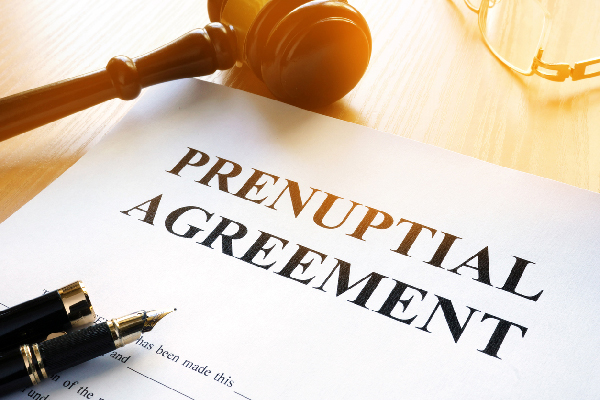
When deciding how to distribute your assets within your estate plan, it is important to consider the impact that doing so could have. The fact is that a disinherited spouse is much more likely to challenge your will and contest its validity than one who at least received some kind of inheritance, particularly if they were not aware of your decision ahead of time and felt blindsided. If your spouse contests you will, this could cause your estate to be tied up in probate court for a long time, which could cost your estate a great deal of money. Some people then choose to try to reduce the likelihood of their estate being challenged by including a small inheritance to their spouse in their will and including a clause in their estate plan denying inheritance to anyone who unsuccessfully challenges the will.
Of course, discussing your decision with your spouse before your death can also help reduce the likelihood that they will contest your will. Either way, if you plan on disinheriting your spouse, or you plan to leave them very little in your will, you should consider working with an estate planning attorney to learn about steps that you can take to protect your estate from potential challenges.
Partner With an Experienced Texas Estate Planning Attorney
As you can see, inheritance rights are complicated, and what your spouse is entitled to upon your death will depend on a variety of factors including the laws in your state. This is why it is imperative that you work with an experienced estate planning lawyer when creating your estate plan. An attorney will be able to help walk you through the inheritance laws in your state, help you understand what your spouse is and is not entitled to after your death, and give you advice on the best steps to take if you want to limit how much your spouse inherits after your death.
Learn More About Disinheriting a Spouse
Feel free to contact us to learn more about the estate planning process as well as for answers to any questions you may have about your estate plan.
For more information please request a copy of our Legal Services Schedule (PDF format).
![]()

As you work on creating an estate plan, it is imperative that you ensure that all of your assets are accounted for and included in your will or trust. However, as digital investments such as cryptocurrency become more common, you may find yourself wondering whether you should include these assets in your estate plan, or if it is even possible. Particularly if you are new to cryptocurrency, you may feel uncertain about what steps you need to take to protect these investments after your death.
Fortunately, you are not alone if you feel this way, as the emergence of cryptocurrencies like Bitcoin and other assets that use blockchain technologies (like NFTs) has left many people confused as to the effects these assets will have on their estate plans. If you have been left feeling uncertain how cryptocurrency could affect your estate plan, here is a look at answers to the most frequently asked questions we have received about cryptocurrency and estate planning.
What Is Cryptocurrency?
Of course, as we begin talking about cryptocurrency and estate planning, you may find yourself wondering what exactly cryptocurrency is. Essentially, cryptocurrency is a form of digital cash that can be exchanged for goods and services similar to traditional currency. However, the primary difference between traditional currency and cryptocurrency is that cryptocurrency is not backed by a government entity. Instead, cryptocurrency operates within a "blockchain", which is also referred to as a public ledger. Cryptocurrency users from around the world verify cryptocurrency transactions by using their computers to solve complex algorithms. Unlike traditional "fiat" currency, cryptocurrency can be transferred directly from person to person without involving a third party like a bank, allowing for faster, simpler transactions.
One of the biggest differences between cryptocurrency and fiat currency is that cryptocurrency does not have a physical object such as a coin or dollar bill to represent its value. Cryptocurrency exists entirely within the digital world. The cryptocurrency was first developed in the wake of the 2008 financial crisis as an alternative to traditional banking with the emergence of the most well-known cryptocurrency, Bitcoin. Cryptocurrency has since taken off with over 1,000 cryptocurrencies have emerged.
While many financial professionals are skeptical about cryptocurrency, many people see it as a stable cash alternative. Considering cryptocurrency continues to grow in popularity, and more businesses are beginning to take cryptocurrency as a form of payment, it is likely that cryptocurrency will be around for a while. Thusly, if you are like many people and are considering acquiring cryptocurrency, or you have already done so, it is critical that you make sure that this valuable asset is protected by including it in your estate plan.
Should I Include Cryptocurrency in My Will?
As you begin to acquire cryptocurrency, it is vital that you make sure that these assets are accounted for in your estate plan. Even though cryptocurrency is new, there are already plenty of cautionary tales of Bitcoin investors who left behind massive digital wealth, but family members were unable to access it after their loved one's death. If you own cryptocurrency, it is critical that you not only include it in your will, but you will also need to provide a guide for your loved ones on how they can access it. To ensure your loved ones are able to inherit and access your cryptocurrency following your death, you will need to:
- List your cryptocurrency in your will.
- Include information about your digital wallets in your will.
- Create a memorandum to your will that includes passwords and PINs for accessing your cryptocurrencies.
- And include a step-by-step guide in your will explaining how your beneficiaries can access your cryptocurrency.
Transferring digital blockchain-based assets to your beneficiaries is not simple. In order to ensure your digital wallet is not lost after your death, you need to ensure that you have included the proper provisions in your estate plan to make it possible for your loved ones to access your cryptocurrency.
Is It Better to Include Cryptocurrency in a Trust?

While leaving your cryptocurrency to your loved ones in a will can help prevent your cryptocurrency from being lost, there is still a risk that your beneficiaries may struggle to find and use your cryptocurrency after your death, and less tech-savvy beneficiaries may be unsure what to do with it. People with cryptocurrency may then find it more beneficial to include a trust in their estate plan for the safekeeping of their cryptocurrency. Here is a look at just a few of the reasons you should consider transferring your cryptocurrency to a trust before your death.
Keeps Your Cryptocurrency Out of Probate
When you die, most of your assets will have to go through probate court (depending on the laws in your state) before they can be passed to your beneficiaries. Even if you have a will, your estate must pass through court before your property is distributed. This process can take months, or even years, making it a costly and time-consuming process for your loved ones during a difficult time.
During the probate process, your beneficiaries won't have access to your cryptocurrency. Considering the volatile nature of cryptocurrency, your digital wallet could lose significant value before your beneficiaries even have access to it. Alternatively, should you create a trust and place your digital wallet within the trust before you die, your cryptocurrency will bypass the probate process. Your successor trustee will have immediate access to your cryptocurrency following your death, which can save your loved ones time and money.
Ensures Someone You Trust Oversees Your Cryptocurrency
Including your cryptocurrency in your estate plan will help to ensure that your cryptocurrency is not forgotten after your death. However, if your beneficiaries are not tech-savvy, they may still have trouble accessing or using it, which could result in your cryptocurrency being lost or stolen. Alternatively, under a trust, you can choose a successor trustee to manage your cryptocurrency who is already familiar with digital wallets and knows how to navigate cryptocurrency exchanges. Your trustee will be responsible for accessing and maintaining your digital wallet as well as distributing it in accordance with the terms of your trust. This also gives you a chance to have a say in how your cryptocurrency is managed following your death, which can be helpful if you want your beneficiaries to stay invested in cryptocurrency.
Learn More About About Cryptocurrency and Estate Planning
Ultimately, whether you choose to include your cryptocurrency in a will or a trust, including your digital wallet in your estate plan will help to protect these assets and prevent them from being lost upon your death. Feel free to contact us to learn more about incorporating cryptocurrency into your estate plan.
For more information please request a copy of our Legal Services Schedule (PDF format).
![]()
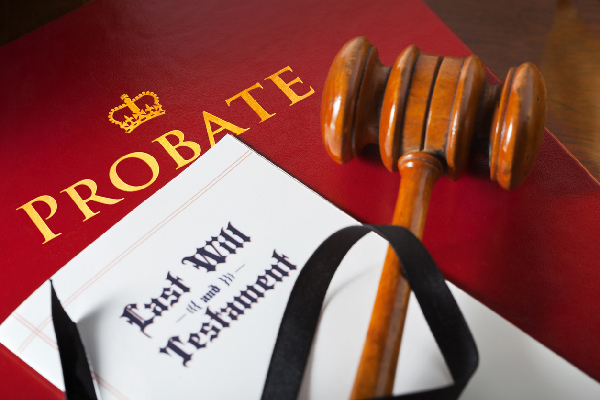
If you've been asked to serve as the executor of a will, you will likely feel honored. Being selected to be an executor means that a person has faith in you to carry out the duties assigned to an executor. Yet, you may also find yourself feeling overwhelmed by the weight of this decision. Remember that this is a decision, and you have every right to say no.
Fulfilling the legal duties of an executor is tedious work that takes time to complete. Thus, do not rush into making a decision out of a sense of duty or obligation. Ultimately, this decision shouldn't be taken lightly. So, feel free to take time to research and think about this responsibility before giving your answer. To help you decide if being an executor is right for you, here is a look at a few frequently asked questions we receive about being asked to act as an executor.
How Difficult Is the Job of the Executor?
The most common thing people ask is how difficult this role really is. Considering that the executor is tasked with handling an individual's final affairs, the difficulty of this job depends on the complexity of the estate. If the deceased had a modest estate with a home, a car, and a couple of bank accounts, then it may not be too difficult. However, if they had a large, complex estate consisting of multiple properties, several investment accounts, a stock portfolio, or even a business, you may quickly find yourself overwhelmed by all of the duties you will need to fulfill.
Before you agree to the job, you should then ask the person appointing you as executor what their estate includes so that you can make an informed decision.
Will It Be Time Consuming?
When considering becoming an executor of a loved one's estate, it is important that you think about the considerable time commitment this represents before you take the job. While how time-consuming being an executor is will depend on the complexity of the estate, you should expect to have to complete a variety of administrative tasks such as filling out paperwork, meeting with lawyers, going to courthouses, taking phone calls, and visiting banks or other financial institutions, all of which can quickly eat up your free time. Before agreeing to the job, you should then think about how busy your personal and professional life currently is.
If you have the free time to spare and want to act as executor as a way to honor a loved one, then this may be the job for you. However, if you already have countless professional and familial commitments, then you should consider politely declining or requesting that there be a co-executor.
How Will I Know If I'm Right for the Job?
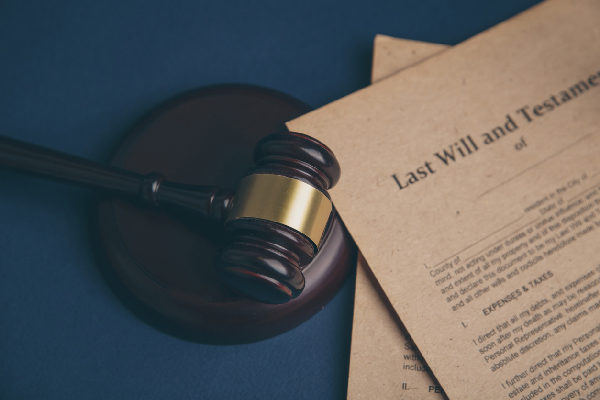
Ultimately, the decision to serve as executor of someone's estate is a personal one, and you will have to make this decision for yourself based on what you have read about the duties an executor is assigned. You may decide that you want to take the job as a way to honor your loved one once they are gone. Yet, if you still find yourself wondering if you are right for the job, here is a look at a few questions you should consider asking yourself that can help you make this important decision.
Do I Understand the Duties of the Executor?
It is important that you fully understand what you are signing up for before you agree to be an executor. As the executor of someone else's will, you will be responsible for a variety of critical, sensitive tasks including locating and reviewing the will and filing it with the probate court. You will then be in charge of managing the estate's assets and overseeing distributing the deceased's assets as directed by the will and/or probate court before settling the estate. You may also be in charge of making funeral arrangements, locating life insurance policies, and obtaining copies of death certificates. It is also up to the executor to ensure that the estate's debts, taxes, and other final expenses are paid. Being an executor is then no small task, and you need to decide if you are up to the challenge when making your decision.
Am I Organized?
One of the biggest things you will need to consider is how good you are at staying organized and meeting multiple deadlines. As you have likely realized by now, there are many tasks that are assigned to an executor, many of which require keeping track of paperwork and meeting specific deadlines. If you have experience with administrative work, you may find the duties of an executor second nature to you. However, if you do not have experience filing and obtaining records, keeping track of payments, reading contracts, or reviewing/filling out complex paperwork, the duties of an executor may take their toll, leading to stress, anxiety, and sleepless nights. It is particularly important that you do not accept the job if you have a hard time meeting a deadline, as this can land you in legal trouble if you do not complete your executor responsibilities within a given timeframe.
Am I Good at Conflict Resolution?
It is important that you also take a moment to think about how comfortable you are dealing with people and handling potential conflict. An executor spends a great time dealing with people and helping to keep the peace during a difficult time. The fact is that the loss of a loved one can take its toll, and even family members that generally get along may start to quarrel in their time of grief, particularly if there are disagreements over how the estate should be handled. As the executor, you will need to be able to keep a level head and help keep the peace during this difficult time. If you are not good with conflict, or the thought of acting as a moderator makes you uncomfortable, then you may want to graciously decline the position.
Need Help as an Executor?
Agreeing to act as an executor is a major decision that should not be taken lightly. This job requires a significant time investment, but it can also be a great way to honor someone you care about once they are gone. If you have been asked to act as executor of a loved one's estate, feel free to contact us for more advice on how you will know whether the job is right for you.
For more information please request a copy of our Legal Services Schedule (PDF format).
![]()

If you own a pet, there is a good chance that you consider your furry-friend family. Yet, even the most dedicated pet owners likely have not considered what will happen should they pass away. However, the reality is that pets are fairly dependent on their owners. Thus, you want a plan in place for their care should you die before them.
Incorporating a pet planning component in your estate plan ensures that your pet(s) receive care after should the unexpected occurs. By leaving your pet (and money for care) to someone you trust, you ensure that they receive care. However, if you had not previously considered including your pets in your estate plan, you may find yourself wondering what estate planning for your pet entails. Keep reading for a look at the most frequently asked questions we receive about pets and estate planning.
What Happens If I Don't Include My Pet in My Estate Plan?
Unfortunately, many people do not think about what will happen to their pets after they die. However, without the proper estate planning measures in place, you have no say in what happens to your pet once you are gone. Then, they could end up neglected or in a shelter. Unless you have made arrangements for the care of your pet upon your death, your pet will go to the residuary beneficiary named in your will (this is the person you've named to receive the remainder of your estate after any specific gifts have been paid out by your estate). If you do not have a will, your estate will be divided up in accordance with your state's intestacy laws.
Unfortunately, pets are considered property, and they will be treated as such in probate court. This could mean that your pet goes to someone who will not take care of them properly (or who does not have the means to care for them). Then, they could wind up in a shelter. Sadly, this is an all too common occurrence, as it is estimated that over half a million pets wind up in shelters each year across the country because arrangements were not made for them before their owner died. Fortunately, this can be prevented by including a pet planning component in your estate plan.
I Made Arrangements With a Friend. Isn't That Enough?
Oftentimes, people think that they do not need to make formal arrangements for their pets. However, without any legal arrangement, there is no way to ensure that your pet ends up with the person you chose. While you may view your pet as family, the law views them as property. Thus, a verbal agreement does not ensure a legal transfer of ownership once you are gone.
You need something legally binding in place in order to ensure that your wishes are followed regarding the care of your pet after your death. You should make sure to name backup successors to care for your pet in case your first choice guardian is no longer willing, or able, to do so following your death. This will ensure that your pet is cared for properly once you are gone.
What Are My Options for Including My Pet in My Estate Plan?

Knowing how important including your pet(s) in your estate plan is in order to ensure that they are cared for once you are gone, you may find yourself wondering what your best option is for incorporating your pet into your estate plan. While you cannot leave your pet money in your estate plan since they are considered property, you have several options you can choose from that will help to ensure that your pet is looked out for after your death. Here is a look at a few of the most popular options.
Include Your Pet in Your Will
The simplest way to ensure the care of your pet is to leave him/her to someone in your will or living trust. After you die, your designated caretaker will become your pet's new owner. However, just because the person you chose wants to look after your pet, this does not necessarily mean that they can. You may then want to consider leaving that person money in your will or trust for the care of your pet.
Any money left for them in your will becomes theirs. Then, they can use it as they see fit without any legal recourse if they use it for personal matters. It is then important that you choose someone you trust to care for your pets.
Establish a Pet Trust
Due to the potential complications of leaving your pet to someone in your will, your best option may be to create a separate trust for the protection and care of your pet. With a pet trust, you will have more control over how your pet is cared for once you are gone. When you create the trust, you can provide terms dictating how you want your pet to be cared for once you are gone, and you can fund the trust with money that can only be used for the care of your pet. This helps to ensure that your wishes are followed, as your trustee can face legal repercussions if they do not follow the terms laid out in the trust.
Depending on the estate laws in your state, you will either be able to create a pet trust that lasts for 21 years after your death, or you may be able to create a trust that lasts for the lifetime of your pet. Creating a pet trust gives you the most flexibility and control over how your pet will be cared for following your death. You can even dictate how any remaining funds in the trust should be dispersed following your pet's death.
How Do I Know Which Option Is Best for Me?
Considering our furry friends often feel like family members, you are not alone if you find yourself struggling to decide what route is best for providing for your pet's care once you are gone. Fortunately, you do not have to go through this process alone. An experienced estate planning attorney can play a vital role in helping you to create a plan that will ensure your wishes for your pet's care are followed once you are gone. Feel free to contact us for advice on the best way to include your pet in your estate plan.
For more information please request a copy of our Legal Services Schedule (PDF format).
![]()